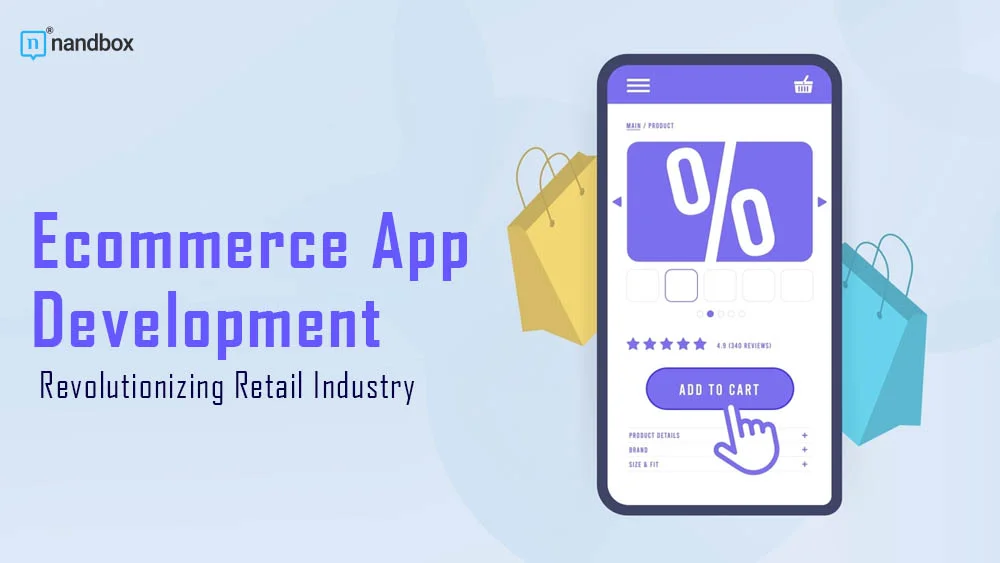A Beginner’s Guide to Ecommerce App Development
Trips to malls and exploring different shops are something else that we all enjoy. However, sometimes they can be very impractical. So, for instance, let us imagine that your favorite jacket just got ruined and you just realized that you need a new one. This is an emergency that could not wait for a shopping trip. But, now, all you have to do is open an e-commerce app, browse through the rich product list, and find yourself a jacket. That is it; you don’t need to go through the mundane task of browsing multiple shops to find something nice. This flexibility, in addition to many other things that we are going to discuss, is what made e-commerce apps and e-commerce app development extremely in demand.
In this article, we will demonstrate the exceptional shift to e-commerce app development and how a business can enjoy an effective and engaging one.
What is an E-Commerce App?
Let us begin by defining what e-commerce apps are. Of course, many of you have an idea or two, but let us see the whole thing from a different perspective. An e-commerce app is a platform that connects users and retailers. E-commerce apps take different forms and shapes. So, for instance, sometimes an e-commerce app will work as an intermediary where different retailers and sellers can list their products for users. At other times, one seller or retailer will have a complete e-commerce app made solely for listing his or her products and services. We will dive deep into these types later on in the article. The more advanced e-commerce gets, the more we can expect other forms and shapes of e-commerce apps.
How Did E-Commerce Shift From Websites to Applications?
Now that you have a glimpse of the concept of e-commerce apps, let us explore the journey of the great shift from e-commerce websites to applications. Let us establish the fact that the whole idea of e-commerce didn’t start recently; it has been here for as long as we can remember. The establishment of the World Wide Web paved the pathway for retail, alongside many other industries, to be more accessible and advanced. This was considered to be the green light that helped the majority, or even all, retail businesses establish an online presence through e-commerce websites.
As the years passed, e-commerce websites were still doing their jobs optimally. However, the market was shifting rapidly. This includes new technologies, marketing strategies, and more that help e-commerce businesses with global reach. At the same time, there was a new technology that businesses saw that may or may not have good potential. Although applications first appeared in the late 1990s and early 2000s, businesses did not start considering them until the middle of 2010. This is because the early forms of applications didn’t have even a quarter of the potential they have recently. Retail software development played a crucial role in this transition. The more powerful applications got, the more businesses started adopting them as one of their main channels.
So, an example of one of these businesses is Amazon. Amazon is an e-commerce titan that has never stopped since it started. Amazon was one of the e-commerce businesses that launched its app. The first Amazon app was launched in 2008 on the Apple App Store and gained millions of users in no time.
Over the years, apps proved that they were more useful and flexible than websites. Especially with capabilities like offline capabilities and many more. This encouraged businesses to never think twice before shifting from websites to applications.
Benefits of E-Commerce App Development
24/7 Availability
With e-commerce apps, customers have the opportunity to shop whenever they want, unlike in physical stores. As a result, customers in different countries are provided with access to it, and the service is improved overall. Also, by being available at all times, you can serve local clients and attract potential buyers from all over the world, which means additional revenue in the palm of your hands.
Reduced Time and Effort
The convenience of e-commerce apps is beneficial to both consumers and companies. Customers can easily find and purchase products, and businesses can streamline their operations by automating tasks like order processing and inventory management.
Dynamic Pricing Strategies
By monitoring demand, market conditions, and customer behavior in real-time, e-commerce apps allow companies to execute dynamic pricing plans. Thanks to this adaptability, smart price adjustments can be made to optimize income.
Types of E-Commerce Apps
B2B

B2B, also known as business-to-business apps, is a type of e-commerce app that facilitates the process of exchanging products and services between businesses. Instead of mundane meetings and complex exchange procedures, B2B apps provide businesses with a much simpler way through which they can do so. There are plenty of B2B apps on the market, like Alibaba and Amazon Business, that make communication between businesses much better and therefore result in successful transactions.
B2C
The second type of e-commerce app is B2C, or business-to-commerce, which is the type that we usually interact with daily. The business customer apps are the usual shopping apps that you find all over app stores. They facilitate the direct sale of the products and services of one business to users and customers. So, an app of your favorite brand, like H&M, where you shop for all the collections, is a B2C app.
C2C
The last type of e-commerce app that we are going to mention is the C2C app. C2C apps are another type that we are also very familiar with. Customer-to-customer, aka C2C, is an application where users can list a product or service they offer to other users. For instance, eBay is one of the most popular C2C apps that you definitely use once or twice a day.
4 Reasons Why Your Business Should Consider E-Commerce App Development
Efficient Inventory Management
eCommerce app development streamlines stock and inventory monitoring and control by integrating with strong inventory management tools. Businesses with large inventories benefit from this real-time visibility of stock because it helps them avoid shortages, surplus stock, and other problems.
Quick restocking and enhanced oversight of product availability become possible through real-time notifications and updates that keep you informed of inventory levels. Not only does this lead to better company operations overall, but it also helps customers have a better experience because out-of-stock situations are less likely.
Adaptation to Changing Consumer Behavior
The rise of Internet shopping is one example of how consumer habits are always changing. By investing in eCommerce app development, your business can stay ahead of the curve when it comes to customer preferences. Especially if you operate in a dynamic market like fashion. If you want your business to stay relevant in today’s e-commerce environment, when a growing number of customers are making purchases using their smartphones and other mobile devices, you need a mobile app.
Accepting this change will set your company up for a prosperous future in an industry where digital communications are becoming more important to people’s everyday lives, in addition to satisfying the expectations of your current customers.
Sustainability and Eco-Friendly Initiatives
It is all about sustainability and achieving sustainable goals through mobile apps now. You may use e-commerce apps to spread the word about how great it is to be green and sustainable. The use of features like sustainable product labeling, information on recyclable packaging options, and initiatives to lessen the detrimental effects of shipping on the environment can help the brand get a positive perception.
This can show your customers that you care about the environment and your community by committing to sustainable practices and associating your business with them.
Main Elements of E-Commerce App Development
UI and UX
The UI and UX are two major components that contribute to the success of an e-commerce application. This is why they take up a large portion of the eCommerce app development process. To make sure that the eCommerce app development process is effective, you have to design your user interface with the main aim of elevating the user experience. So, for instance, the app should be easy to navigate, as users would go through a list with over a thousand products. They have to do this with ease to avoid frustration.
APIs
E-commerce businesses usually have tons of systems. They usually have customer relationship management systems, inventory management systems, and so on. As a result, when they shift to applications, they have to find a way to sync with all of these systems. This is where the significance of APIs appears. APIs are another major part of the eCommerce app development process. They are the point where e-commerce apps and backend systems meet and communicate to exchange necessary information and data. Including APIs is very important for successful e-commerce app development.
Security Measures
An e-commerce app is always full of sensitive information like users’ names, addresses, credit cards, and the vulnerable process of making purchases and transactions. E-commerce app development always has security on top before anything else. This is why security measures are the first thing you should think about if you are going through an e-commerce app development process. Prioritizing security measures includes implementing powerful security protocols like authentication, encryption, and so on.
Can You Accomplish an Effective E-Commerce App Development Process With Nandbox?
You have definitely heard about no-code development, as it is a very popular development approach nowadays. What you may haven’t heard of is the nandbox app builder.
The nandbox app builder is a leading native app-building platform that helps individuals, whether experienced or not, create functional applications. This app builder recently announced a new or more renovated store feature, which will simplify the e-commerce app development process for all users. Well, an app might not be enough. What does nandbox have in addition to the store feature to provide an effective e-commerce app development process?
As per UI and UX, nandbox has an exceptional branding section where users can convert their brand image. Additionally, they have plenty of customization options for the m-store feature to make it more appealing and astonishing.
As per APIs, nandbox has one of the easiest and most efficient API integration processes. With one swift click, a user would integrate different APIs and connect all of his backend systems with his e-commerce application optimally.
Now for the most important part: the security measures. nandbox ensures a secure e-commerce app development process as well as the end product. The app builder incorporates the most powerful security protocols on the market, which maximizes the security of the applications generated through the platform. Additionally, it includes a plethora of renowned payment gateways, like PayPal, to ensure secure and safe transactions.
If you are looking for a place to enjoy your eCommerce app development process, then nandbox is the answer. Try the nandbox app builder now and create the perfect e-commerce app with maximized security, an intuitive user interface, and an engaging user experience.





